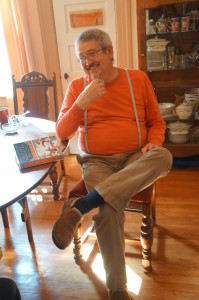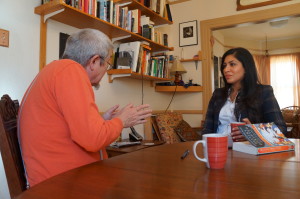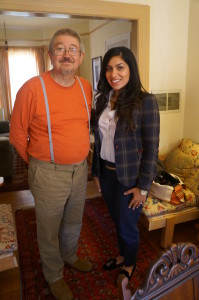by Niala Mohammad
I arrived at a bright red house, situated on a steep road that overlooked the dusty mountains surrounding the unique city of San Francisco. A man with East Asian features, a head full of white hair in a bob cut, a whisky beard, small framed glasses, an orange shirt and suspenders answered the door. He greeted me with a warm pleasant smile and generously invited me inside. As he prepared tea for us, I sat in his living room, taking in the sights of shelves and tables full of books, as well as paintings on the wall that he later told me were made by his daughter.
He was born and raised in Afghanistan to an Afghan father and an American mother. He is a Sayed, and his East Asian features are courtesy of his Hazara grandmother. He grew up in Lashkar Gah, a town in Helmand province where his father oversaw a massive irrigation project that the US initiated during the 1950’s. Tamim explained that during that time, Lashkar Gah was, in fact, considered a little American town – a stark difference to the Lashkar Gah of current times that is known for its insurgents, warlords and opium. At the impressionable age of 16, Tamim left Afghanistan only to return 38 years later, when the Taliban were ousted from power.
Many know Tamim Ansary for a controversial email that circulated around the world. He was the first to speak up against statements made in the media after 9/11 that suggested Afghanistan be “bombed back to the Stone Age”. The email was sent to about 20 of his friends who then sent it to another 20 of their friends, with this cycle continuing until it became a chain email that gained international media attention. His words reflected a truth that many were unaware of. He wrote:
“The Taliban and Bin Laden are not Afghanistan. They’re not even the government of Afghanistan. The Taliban are a cult of ignorant psychotics who captured Afghanistan in 1997 and have been holding the country in bondage ever since. Bin Laden is a political criminal with a master plan. When you think Taliban, think Nazis. When you think Bin Laden, think Hitler. And when you think “the people of Afghanistan” think “the Jews in the concentration camps.” It’s not only that the Afghan people had nothing to do with this atrocity, they were the first victims of the perpetrators. They would love for someone to eliminate the Taliban and clear out the rats nest of international thugs holed up in their country. I guarantee it…Some say, if that’s the case, why don’t the Afghans rise up and overthrow the Taliban themselves? The answer is, they’re starved, exhausted, damaged, and incapacitated.”
Tamim Ansary humanized the Afghan people by explaining them and their circumstance in terms that Americans could relate to and understand. In an exclusive interview with VOA Deewa, Tamim stated, “Because I grew up bi-culturally in both places, …I was in a position that enabled me to see what the people on this side thought and what the people on this side thought [Tamim gestured his hands from one side to another]. And I was on the top of that fence and they couldn’t see each other. I felt a responsibility to explain the two sides to each other.” From that point on, Mir Tamim Ansary served as a bridge between the two vastly different cultures of Afghanistan and America.
Tamim Ansary has written several books including Destiny Disrupted: A History of the World Through Islamic Eyes, West of Kabul, East of New York: An Afghan American Story, The Widow’s Husband, and Games without Rules: The Often-Interrupted History of Afghanistan. These books have helped countless Americans better understand the Afghan people, as well as their history and society.
Not only did he make it his mission to help Americans understand Afghanistan – he also uses his talents and skills to empower the Afghan-American community by serving as a mentor for first generation Afghan-Americans like himself. In his spare time, Ansary directs the oldest free writing workshop in North America, where he offers private workshops and conducts one-on-one consultations with select writers. “Afghan-Americans – they have an experience that is kind of wrenching. Because they came in under the shadow of their parent’s holocaust, they are divided between two worlds….and after 9/11 more so. There is a sense of displacement and a sense of not being in your home. And then it’s natural to suppose your home is Afghanistan especially because parents are always nostalgically talking about their homeland. So now you are seeking your identity in the very thing that the whole world your actually in touch with is saying is despicable. That is psychologically interesting and complex. I felt like these kids should be writing about this. So I got a grant and I started a project to get young Afghan-Americans to write.” The New York Times bestseller, The Other Side of the Sky: A Memoir is proof of Tamim Ansary’s passion for mentoring young Afghan writers. He co-authored the memoir of his student-protégée Farah Ahmedi who tells the tale of her prevailing journey from Afghanistan to America.
Ansary is equally American as he is Afghan but it took him a while before he would come to terms with his cultural identity. Growing up he always felt like an outsider. Tamim said, “no matter what room I walked into, whether it was a bunch of Americans or a bunch of Afghans…people would think: ‘the outsider is here.’” Perhaps the events of 9/11 are what compelled him to finally feel comfortable in his own skin – and help other Afghan-Americans make peace with their identity, as well.




2 responses to “Tamim Ansary – An Exemplary Afghan-American”
Nice article, but you need to give Tamim’s name in the first paragraph.
I just read Farah Ahmedi’s book – thank God Ansary helped her – her voice is strong and I will read it to my students.